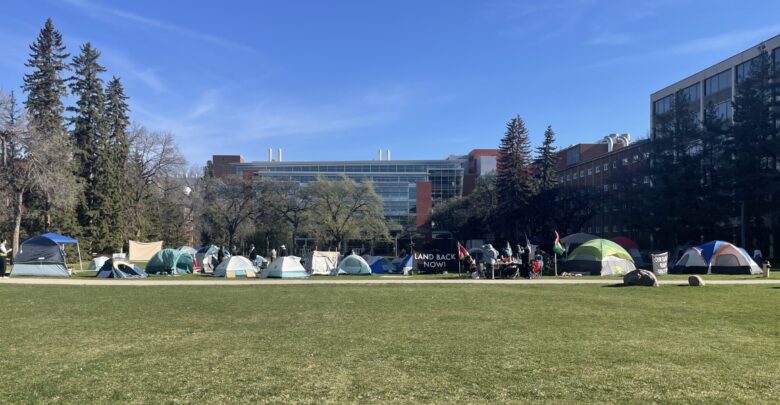Professor and student address claims about Palestine solidarity encampment
A letter from U of A professor David Kahane to the Presidential Review Committee calls against the reappointment of current President and Vice-chancellor Bill Flanagan. According to Nour Salhi, "the student movement has not finished."
 Lily Polenchuk
Lily PolenchukCalls for University of Alberta President and Vice-chancellor Bill Flanagan’s resignation followed his decision to have the Edmonton Police Service (EPS) remove a Palestine solidarity encampment at Main Quad on May 11.
Flanagan’s current term is set to end on July 1, 2025. He is seeking a second-term as president, and as such, his performance is currently undergoing the presidential review procedure.
David Kahane, a professor in the department of political science, sent a letter containing “new and important eyewitness information” about the encampment to the 2024 Presidential Review Committee on May 18. In it, he said that Flanagan should not be reappointed “because of the damage he has done to the university’s reputation and the needless violence and harm he instigated toward students, faculty, and the wider community.”
In an interview with The Gateway, Kahane said he wanted to “debunk the stories that are being told” with the letter. But, he also hopes the university “can appreciate what was safe and admirable” about the encampment.
“When we can do that, we can actually engage properly with the students’ demands,” Kahane said. “But in order to open the door to that, we have to get some things out of the way, [including] lies and distortion of unsafety in the encampment.”
People’s University for Palestine YEG, a student-led movement that organized the encampment, continues to demand that both the U of A and MacEwan University disclose financial investments with Israeli institutions, divest from those investments, provide amnesty for protestors, and issue an immediate condemnation of “the current genocide of Palestinians.”
An open letter organized by Faculty for Palestine Alberta that echoed these demands and called for Flanagan’s resignation amassed 330 faculty signatories from Alberta universities, and over 3,300 alumni, community member, parent, staff, and student signatories, as of May 20.
In an interview with The Gateway, Nour Salhi, a MacEwan student and spokesperson for People’s University for Palestine, said the clearing of the encampment was “a wake-up call for the community.”
“The students are not feeling defeated but are actually feeling stronger than ever,” Salhi said. “We remain firm with our demands and will continue working towards holding our institutions accountable.”
Trespass notices were communicated as a “formality,” according to Kahane
In his letter, Kahane addressed claims that Flanagan and EPS have made, firstly that those in the encampment disobeyed orders to disperse. He said Palestinian student organizers’ requests to meet with Flanagan months before the encampment began had not been met, causing them to mistrust university officials.
According to Salhi, Palestinian students have made “many efforts to speak with Flanagan and ensure that there are supports for students as they go through watching a genocide be enacted on their families.” She added that Flanagan had not visited the encampment nor communicated with campers.
Kahane wrote that he was the intermediary between the encampment and Frank Page, U of A Protective Services (UAPS) threat assessment program and investigations manager. Page was “the only face the university ever showed to students.”
According to Kahane, Page told him during their first meeting that “the university would not seek to end the camp and would not call in EPS to clear the camp unless there was violence.” Additionally, Kahane wrote that Page offered to supply garbage cans, first-aid supplies, a fire extinguisher, and fencing. Later that day, Kahane said she brought a fire extinguisher, first-aid kit, and the first trespass notice that “was a formality.”
“On the first day, trespass notices were communicated as being a technical legal requirement for the university, congruent with the encampment being allowed to stay,” the letter read.
“The student movement has not finished,” Salhi says
In a statement published on May 12, Flanagan said “the encampment posed a serious and imminent risk of potential violence and injury.” He cited “potential weapons,” including hammers, axes, and screwdrivers that were found after the encampment was dismantled.
Flanagan also said the encampment was collecting wood pallets, which are known to be used for barricades and are a fire hazard. His statement read that after asking the encampment to remove all wood pallets, 17 were found within 150 meters of the encampment.
Kahane wrote that Page told the encampment the pallets were a “combustion hazard,” but did not communicate a concern about barricading. He added that the pallets were “taken out of the camp at least nine hours before the raid by riot police,” and the tools were used for setting up the camp and banners.
Flanagan’s statement on May 12 said that “only 25 per cent of the camp’s occupants were U of A students,” and most weren’t members of the university community. In his letter, Kahane said that the U of A “has no way of knowing how many of the encampment participants were U of A students, staff, or faculty.”
According to Salhi, there were U of A students, faculty, and alumni present at the encampment.
“When [Flanagan] tries to state things like, ‘we are dedicated to protecting the university’s community by dismantling the encampment,’ it implies that anyone who was at the encampment is not part of the broader U of A community,” Salhi said. “That is a very harmful narrative.”
“The student movement has not finished. We’ve stated that until our demands are met, we will not stop, and that is the case for both the U of A and MacEwan.”




